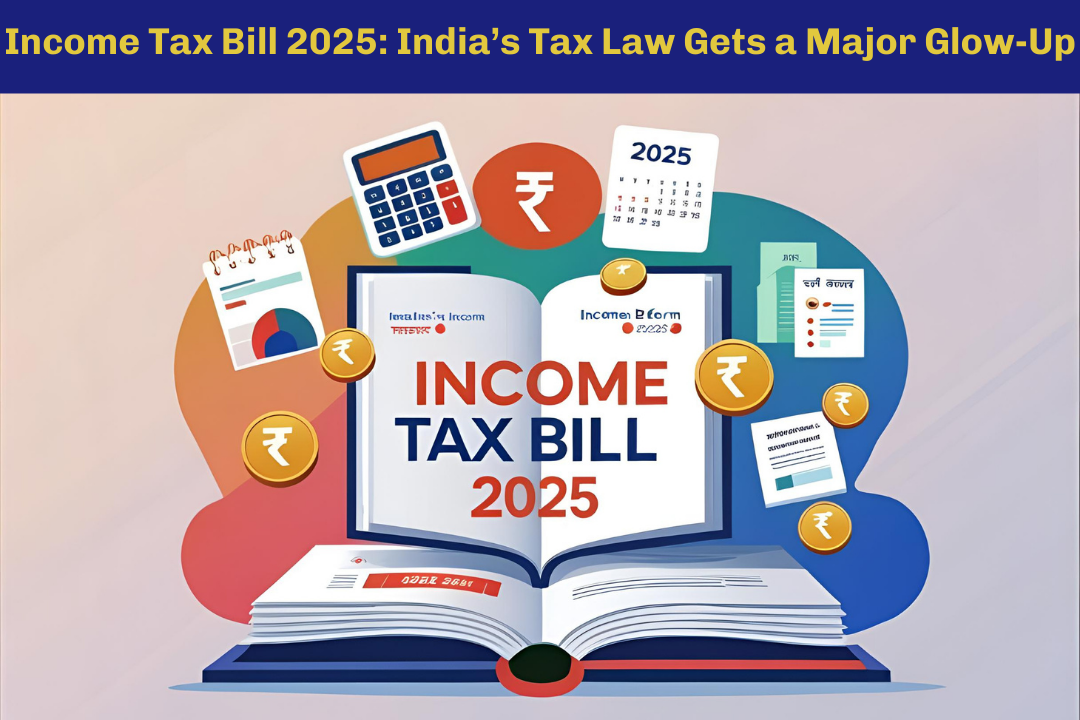Income Tax Bill 2025: Key Changes, Impact & Simplified Tax Law Explained
By Filing Buddy . 13 Aug 25
1. Introduction: The Dawn of a Simpler Tax Era
“India’s tax law just got a long-overdue wardrobe change after wearing the same 1961 outfit for over 60 years.”
That’s right. For decades, we’ve been flipping through a bulky, often confusing rulebook, the Income Tax Act, 1961 that had been patched, amended, and stitched together so many times it looked like the legal equivalent of a patchwork quilt. Now, the government has decided it’s time for a fresh, clean, and modern outfit.
Enter the Income Tax Bill 2025, a landmark reform that has officially cleared both the Lok Sabha and the Rajya Sabha, and is now waiting for the President’s signature to become the law of the land. Think of it as a tax code spring-cleaning without changing the furniture (read: tax rates).
What’s the big deal?
Unlike earlier amendments that just added more clauses and complexity, this bill completely replaces the old Act with a simpler, more structured, and easier-to-read framework. The focus is on tax simplification in India, cutting down legal jargon, and reorganizing rules so that even a non-finance person can follow them.
The core promise of the Income Tax Bill 2025:
- Simplify: Shorter sections, clear language, and logical flow.
- Modernise: Introduce globally aligned concepts like a unified tax year.
- De-jargonise: Replace cryptic legal terms with plain English (or plain Hindi, when translated officially).
Why should you care?
Whether you’re a salaried employee, business owner, or pensioner, this is not just a lawyer’s playground - it’s your money, your returns, and your compliance process on the line. Even if your tax slab doesn’t change, the way you file, claim refunds, or understand deductions will. And for pensioners, the new law is like a warm cup of chai on a winter morning - comforting, beneficial, and long overdue.
2. Why the Change Was Needed
Imagine trying to read a book where every chapter has been edited by a different author, in different decades, and in different moods - some chapters are short and sweet, others are 10 pages of pure legal gibberish. That’s what the Income Tax Act, 1961 had turned into.
Over 65 amendments and 4,000+ tweaks later, it had become what tax experts politely call complex, and what the rest of us would call a “Frankenstein’s monster” of tax laws. Even seasoned chartered accountants sometimes had to reread sections multiple times just to be sure they weren’t missing a hidden proviso tucked away in legal spaghetti.
The Government’s Vision
The aim with the Income Tax Bill 2025 is simple — create a shorter, clearer, and easier-to-follow law. One that doesn’t require a magnifying glass, a legal dictionary, and two cups of coffee to decode.
The Three-Step Makeover Plan
- Plain Language Over Legal Jargon
Out with the tongue-twisters and nested sentences. In short, crisp, understandable language so that taxpayers don’t feel like they’re reading a law thesis. - Cutting the Fluff
Redundant and repetitive clauses have been trimmed away, just like decluttering a wardrobe that still had outfits from the 80s. - Logical Restructuring
Related provisions now live together in the same section or chapter — because if your salary rules are on Page 3 and exemptions on Page 97, you’re just wasting everyone’s time.
Bottom line: This isn’t just a face-lift, it's a ground-up rebuild to make tax compliance in India less about “interpretation” and more about “understanding.”
3. Key Highlights for All Taxpayers
The Income Tax Bill 2025 isn’t just a legal update it’s a complete spring-clean for India’s tax code. And unlike most “big reforms,” this one is refreshingly non-scary because your tax rates stay the same. Here’s what’s changing for everyone:
50% Lighter Law
The old law had 819 sections across 47 chapters. The new one trims it down to 536 sections and 23 chapters. That’s almost half the bulk, without losing the essentials because sometimes, less really is more.
Tables Over Paragraphs
More tables, fewer walls of text. The number of tables has jumped from 18 to 57, making it easier to scan and find exactly what you’re looking for. Goodbye, endless scrolling.
Unified ‘Tax Year’
No more “assessment year” vs “previous year” confusion; there's just one unified tax year. This aligns with global taxation practices and makes it easier for people to understand when exactly they’re being taxed.
Refund-Friendly Rules
Missed your filing deadline? You can still claim refunds under the new rules. A small but meaningful win for the procrastinators among us.
Faster TDS Corrections
The time allowed to correct TDS statements is now 2 years instead of 6. This means fewer lingering errors and quicker resolution of tax mismatches.
Consolidation of Provisions
Salary rules, exemptions, NPO provisions all grouped neatly into chapters or schedules. For example, Section 10 exemptions now sit in easy-to-read tables. No more scavenger hunts through 100+ pages.
No Shock Changes
Tax rates? Unchanged. Popular deductions? Still there. This reform is all about making your life easier, not shaking up your finances overnight.
4. Special Section: Pensioners, This One’s for You
If you’re retired (or counting down the days to it), the Income Tax Bill 2025 brings some very welcome news. For years, pensioners have had to deal with confusing rules, partial exemptions, and a constant worry about how their hard-earned savings would be taxed.
This new law says: “Relax, we’ve got you covered.” Here are the Top 5 Pensioner-Friendly Changes you should know:
1️.Unified Pension Scheme (UPS) Perks
If you’re subscribed to the Unified Pension Scheme (UPS) under the National Pension System (NPS), you can now withdraw up to 60% of your total pension corpus completely tax-free at retirement.
- Applies whether you retire due to superannuation, voluntary retirement, or even certain approved early retirements.
- This benefit is tied to conditions in the January 24, 2025 government notification — so check the fine print, but for most, it’s a clear win.
2️.Foreign Retirement Accounts
Have a retirement benefit account in an approved foreign country? The income from it is now fully exempt from Indian taxes. This is a big plus for Indians who’ve worked abroad but plan to retire in India — no double taxation headaches.
3️.Full Tax Exemption on Commuted Pensions
Earlier, full exemption was a privilege mainly for salaried employees. Now, everyone with an approved pension scheme — including self-employed professionals and other contributors — can enjoy complete tax exemption on commuted pensions. That lump sum you get? 100% tax-free.
4️.Clarity on Early Withdrawals
Partial withdrawals before your pension matures often led to disputes with the tax department. The new law lays out clear, specific rules for how these are taxed, so you’re not left in the dark (or in a prolonged argument).
5️.Family Pension Deduction Still Intact
If you’re receiving a family pension, you can still claim a deduction of one-third of the pension amount or ₹15,000 - whichever is lower. It’s a small but important relief for those who depend on this income.
Bottom line for pensioners: These changes mean more money in your pocket, fewer legal grey areas, and less paperwork stress. Whether you’re already retired or planning ahead, this is one set of tax reforms you’ll actually enjoy reading about.
Here’s how you could enrich your Special Section: Pensioners with your ideas implemented:
Pensioners, This One’s for You – Tax Benefits Under the Income Tax Bill 2025
Meet Mr. Sharma
Mr. Sharma, 65, a retired bank manager, always dreaded the tax filing season. Between confusing clauses, partial exemptions, and endless paperwork, he often felt like his pension was being nibbled away by the taxman.
But with the 2025 Bill, here’s the twist: He can now withdraw a larger portion of his NPS corpus tax-free, enjoy exemption on income from his UK retirement account, and even claim the family pension deduction without any grey areas.
*Savings vary based on pension size, corpus, and personal tax slab.
5. How the Bill Was Crafted
Big reforms don’t just appear out of thin air and the Income Tax Bill 2025 is proof of that. Behind this “simpler” law lies an incredibly complex process that combines public feedback, international best practices, and months of government grind.
Crowdsourced Wisdom
Before putting pen to paper, the government invited suggestions from the public. The result? 20,976 online submissions from citizens, businesses, tax professionals, and industry bodies. Each was reviewed, debated, and, where relevant, woven into the final draft.
Learning from the Best
Why reinvent the wheel when you can learn from countries that have already done a tax code revamp? India’s drafting committee consulted with tax authorities in Australia and the UK, both of which have gone through similar simplification exercises. This helped avoid common pitfalls and adopt proven ideas.
The Massive Effort
It took a dedicated team of around 150 officers working over 60,000 man-hours to prepare the bill. And yes, somewhere in the official records, there’s probably an uncounted figure for “cups of chai consumed” because no Indian reform happens without it.
Why this matters for you:
This wasn’t a closed-door exercise. It’s a tax reform built with public input, global perspective, and serious groundwork, which means it’s more likely to be practical, fair, and relevant to everyday taxpayers.
6. The Big Picture: Impact & Outlook
The Income Tax Bill 2025 isn’t just a legal update, it's a roadmap for a simpler, fairer, and more predictable tax environment in India. Here’s what it means going forward:
Ease of Compliance
From salaried individuals to SMEs and large corporates, the new framework is designed to reduce paperwork, cut confusion, and save time. Clear definitions and consolidated provisions mean fewer grey areas and fewer tax headaches.
Boost to Global Investor Confidence
Predictable tax rules are a magnet for investment. By aligning with global best practices and ensuring policy stability, India signals to investors both domestic and foreign that the new tax framework is here to stay.
Transparency at Your Fingertips
A section-by-section mapping of the old vs new provisions is now available online. This makes it easy for taxpayers, accountants, and legal teams to understand exactly what’s changed — and why.
Smooth Transition, No Rights Lost
Worried about the switch? Don’t be. Your rights under the old Income Tax Act remain protected during the transition, ensuring no sudden shocks for taxpayers.
Bottom line:
The impact of the Income Tax Bill 2025 goes beyond compliance; it's about creating trust, predictability, and a tax system that’s finally as modern as India’s economic ambitions.
7. Conclusion: India’s Tax Law Glow-Up
The Income Tax Bill 2025 isn’t just a legal update, it's a user manual for your taxes that you can actually read without a headache. By simplifying language, removing redundancies, and structuring rules logically, the government has turned a once-intimidating document into something far more approachable.
But here’s the catch: the law may be simpler, yet understanding the changes early is still key. Whether you’re a salaried professional, a pensioner, or a business owner, take time now to:
- Review how the new provisions apply to you.
- Check if your tax planning strategies need a refresh.
- Consult your CA or tax advisor well before the filing season.
Because when tax season 2025 rolls around, you’ll want to be ready not scrambling.
Final word: India’s tax system just had its biggest glow-up in decades. Make sure you’re prepared to make the most of it.
8. Disclaimer & Call-to-Action
Disclaimer: This guide is for information and awareness purposes only. Tax laws can be complex and subject to updates. Always refer to the official Income Tax Department website or consult r consult a qualified tax professional before making any financial decisions.
Your Next Step: Bookmark this guide, share it with friends, and stay ahead of the next filing season. An early start means fewer last-minute surprises and more peace of mind when it’s time to file.
Frequently Asked Questions (FAQ) - Income Tax Bill 2025
1. What is the Income Tax Bill 2025 and why has it replaced the 1961 Act?
The Income Tax Bill 2025 replaces the Income Tax Act of 1961 to simplify and modernize India’s tax framework, cutting down complexity and enhancing clarity.
2. How many sections and chapters does the new law include?
It reduces the sections from 819 to 536 and chapters from 47 to 23, streamlining the structure significantly.
3. What is the "Tax Year" concept introduced by the new bill?
The “Tax Year” replaces the older “Previous Year” and “Assessment Year” terms, consolidating them into one unified period for clarity.
4. Does the bill change income tax rates or rebates?
No major rate changes. The ₹12 lakh exemption threshold is retained, and key deductions remain intact.
5. Can late taxpayers still claim refunds under the new law?
Yes. The provisions now allow refunds even if returns are filed late, providing more flexible relief options.
6. How has the TDS correction window changed?
You now have 2 years, instead of 6, to submit TDS correction statements, making compliance faster.
7. What does "faceless assessment" mean under the new bill?
Assessments will be digital-first and “faceless,” reducing human intervention and promoting transparency.
8. Will the bill affect pensioners?
Yes, pensioners are eligible for several benefits, including:
60% tax-free withdrawal of NPS corpus,
Full exemption on commuted pensions,
Clarified taxation on early withdrawals,
Retained family pension deduction.
9. Is income from foreign pension accounts taxable?
No, income from approved foreign retirement accounts is now exempt from Indian tax.
10. Has the Section 87A tax rebate changed under the new regime?
Under the new regime, rebate eligibility is limited to regular slab income. Short-term capital gains are excluded, even if total income is below ₹7 lakh.
11. When will the new law come into effect?
It will be effective from April 1, 2026, for the financial year 2026–27.
12. Will the old tax regime still be available?
Yes, the old regime continues alongside the new one, preserving existing deductions and options.
13. Is the CBDT empowered to create rules under the new law?
Yes, the CBDT retains its authority to frame administrative rules and compliance procedures.
14. Will pending refunds be processed under the new law?
Yes, any pending refunds accrued under the 1961 Act will continue to be honored.
15. Are there changes in penalty provisions for honest mistakes?
Yes. The revised bill encourages honest tax compliance and may waive penalties for inadvertent errors.
16. How are NPO-related provisions handled now?
Non-profit provisions are consolidated and simplified in one chapter, reducing cross-references and improving clarity.
17. Is there section-wise mapping between old and new law?
Yes, section-by-section mapping of old and new provisions will be available on the Income Tax Department's website.
18. Why is this reform considered 'material' despite no major rate changes?
Because it significantly simplifies language, removes redundancies, improves cross-referencing, and modernizes process flows.
19. Were public and committee inputs included in drafting the bill?
Absolutely. The bill incorporated 285 Select Committee recommendations, along with nearly 21,000 public suggestions.
20. Does the law include provisions for digital assets and transparency?
Yes, it includes updated clauses on virtual digital assets, restrictions on anonymous donations, and expanded disclosure norms.
Contact Us
An expert will call you within 24 hours. No payment required to get started.
Related Post

How should a start-up complete ITR filing
Business entities must file their ITR annually to comply with the tax laws of their respective countries. It helps the government assess and collect the appropriate amount of income tax from taxpayers and ensures proper accountability of financial activities.
. 3 Mins.png)
5 step checklist for GST compliance in Indian Startups
Learn about how GST works. The basics of GST along with its compliances. Uncover what your business needs to keep in mind concerning GST rules and GST compliance.
. 3 min read.png)
₹20 Lakhs and Beyond: Understanding GST for Freelancers in India
Are you a freelancer or aspiring to be one? In this blog, uncover the basics of freelancing and requirements involving GST. Learn about all the exemptions, obligations, and compliances of GST for freelancers in india.
. 5 min read

